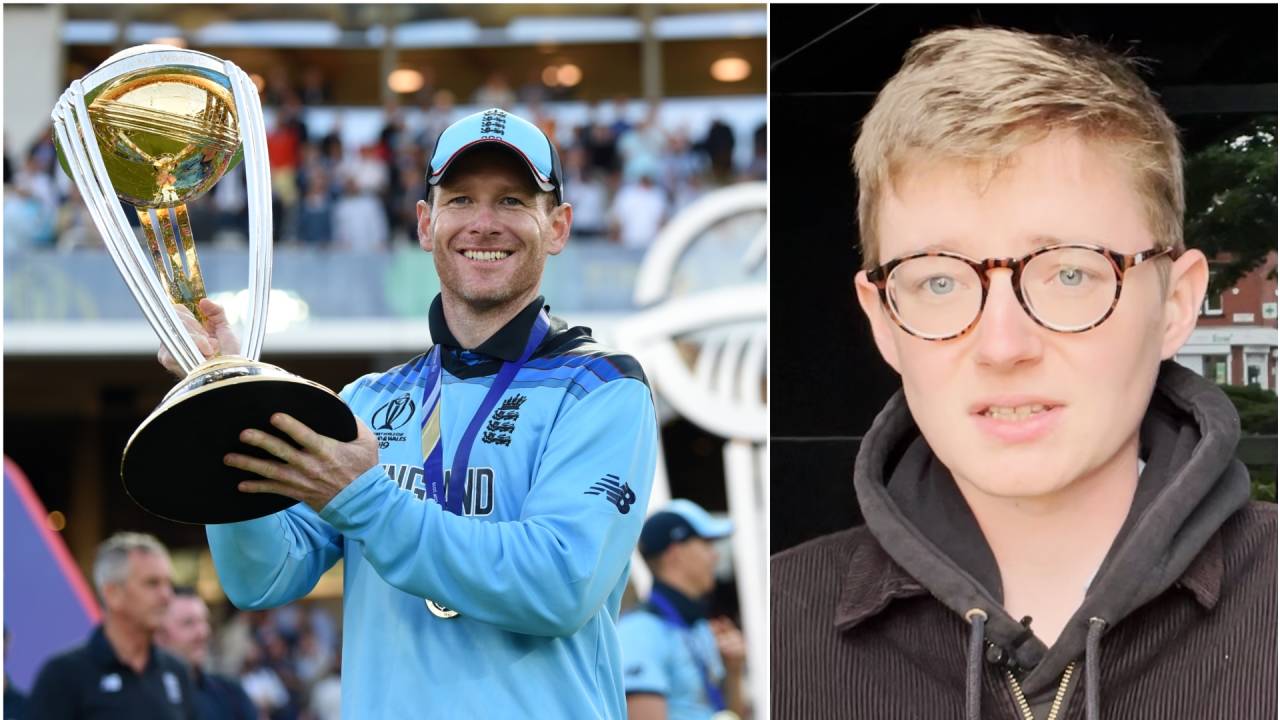All-out attack
At the 2015 50-over World Cup, England played a style of ODI cricket that had long passed its sell-by date: their batters scored at 5.48 per over across the tournament, compared to champions Australia's 6.82. The rule changes introduced in early 2013 - two new balls, and shifts in fielding restrictions - had altered the way the format was played but England did not seem to have noticed.
Morgan was in charge for that World Cup but had been appointed so close to the tournament that he had scant opportunity to change England's philosophy. In their first game of the 2015-19 cycle, they reached 400 for the first time in an ODI with
a new-look, ultra-attacking side built on the principle that batting strength was a clear predictor of success in World Cups.
Crucially, Morgan stuck with his all-guns-blazing approach even in choppy waters. In the third ODI of the new era, against New Zealand in 2015, England were bowled out for 302 in 45.2 overs. "It doesn't disappoint me," he said. "I want the guys to continue with that [attacking] mindset and not worry about batting 50 overs: I think that makes guys hesitate and question their natural way of playing and I don't want that to happen."
Building experience
Andrew Strauss commissioned a review into England's white-ball cricket when he was appointed as managing director in 2015. One of its key findings was that ODI experience was a key contributor to success in World Cups, as measured by the number of caps in the squad: to win in 2019, Morgan and England would have to back a core of players over a sustained period of time.
In the 2015-19 cycle, England gave at least 40 caps to 13 different players and backed their long-term planning rather than over-reacting to form.
Jason Roy, for example, didn't reach 40 against New Zealand in his first full ODI series, "but because he kept attacking, kept playing in the right way for his role in the team, he was kept in," Paul Farbrace has recalled. "He started to get his runs later that summer, and has never really looked back."
Adaptability
Morgan recognised that England's attacking style suited the flat pitches and short boundaries they normally found on home soil but left them vulnerable on slower surfaces. "The wickets are going to be slow, low, they will wear - that's the nature of ICC events," he said during the 2019 World Cup.
England were tested on those pitches, losing to Sri Lanka at Headingley and to Australia at Lord's, but faced with consecutive must-win games at the end of the group stages, they doubled down on their style, racking up 337 for 7 and 305 for 8 against India and New Zealand. In the final, they were bogged down by Colin de Grandhomme in the middle overs but scrapped their way to 241 thanks to Jos Buttler and Ben Stokes' measured restraint, enough to force a Super Over.
England were also adaptable when it came to selection, as shown by two major calls on the eve of the World Cup. When
Jofra Archer, one of the world's leading T20 bowlers, became available, he was selected at short notice ahead of David Willey. He was their leading wicket-taker in the tournament and sealed their win in the final, holding his nerve in the Super Over.
The other was the decision to remove
Alex Hales from the squad after news of a second failed drugs test came to light shortly before the tournament. Only six months earlier, Morgan - along with
Joe Root, the then Test captain - had outlined a mantra of "courage, unity and respect" for England players to follow during a tour of Sri Lanka. Hales' actions were deemed to have fallen short, and he was axed. It was a risk - not least because
James Vince, his replacement, struggled in the World Cup - but it was ultimately vindicated by the trophy.
Building depth
The clarity of Morgan's message quickly filtered down into county cricket: scoring rates in the domestic 50-over competition, the Royal London Cup, climbed from 5.38 in 2015 to 5.99 in 2019. And players increasingly took opportunities to travel the world in the off-season and play franchise cricket in order to become more versatile and develop their skills overseas.
Morgan embodied his belief that more England players should play franchise cricket, missing the first ODI after the 2015 World Cup - a washout in his native Ireland - in order to stay with Sunrisers Hyderabad at the IPL. By 2021, every member of the team England fielded in the T20 World Cup semi-final had played at least one game at the IPL in their career and most said the tournament had played a significant role in their development.
Last summer, England's first-choice ODI squad were forced to self-isolate following a Covid-19 outbreak, but a hastily assembled second-string side then whitewashed a full-strength Pakistan, playing in the same attacking style that Morgan had pioneered. By 2022, there were so many talented batters that Morgan could not command a place in the side based on his batting alone; the depth he had engineered rendered him surplus to requirement.
Embracing diversity
Perhaps Morgan's greatest legacy will be the extent to which he has championed diversity in his side. "I spoke to
Adil [Rashid] and he said Allah was definitely with us. I said we had the rub of the green," Morgan said after the 2019 final. "It actually epitomises our team."
In his final series in the role, Morgan was consulted about Rashid's desire to skip fixtures against India in order to make the Hajj pilgrimage to Mecca. "There were no questions asked,"
Rashid told ESPNcricinfo. "That's a big credit to Morgs for making that environment… it's been like that with England for the past seven years since 2015."
